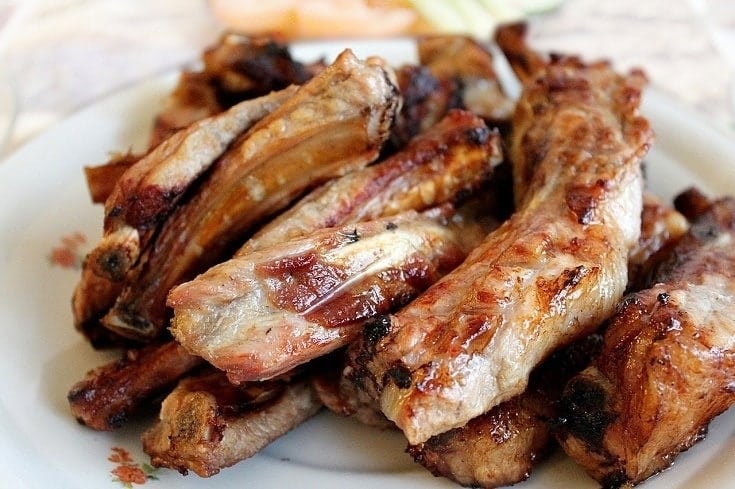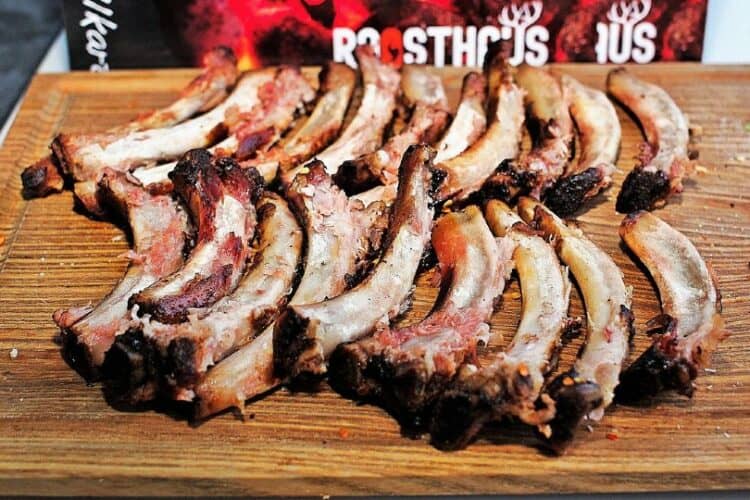As we anticipate warm summer days ahead, many people start to get excited about summer barbeques. Dogs are an active part of families, and they may want to join in on these delicious festivities. While many people believe that bones are tasty treats for dogs, they can be pretty risky and unsafe foods for them.
So, make sure to think twice before you toss your dog a rib bone from your grill. Both raw and cooked bones can be dangerous for them. Continue reading to learn more.
Why Raw Rib Bones Are Unsafe for Dogs
Most dogs won’t be able to resist chewing and snacking on a rib bone. However, improperly prepared rib bones can end up causing many problems for dogs.
Raw rib bones can be harmful to dogs because they can carry bacteria that cause sicknesses, such as Salmonella, E. coli, and Yersinia. Raw bones and meat can’t be left out for more than two hours, and even if they’re packaged, it doesn’t completely eliminate the risk of carrying harmful bacteria. The raw fat on some rib bones can also cause an upset stomach and result in vomiting and diarrhea.
Raw bones are also a choking hazard. Dogs may be able to chew and work through breaking off large chunks of bones. However, the bones may be too hard to break into smaller pieces, and particularly overeager dogs can run the risk of swallowing them whole and choking.
Even if a dog manages to swallow pieces of a rib bone, the pieces can cause blockages in the intestines and result in constipation and an upset stomach.
What About Cooked Rib Bones?
Cooked bones can eliminate the presence of bacteria. However, they need to reach an internal temperature of 145°F to 165°F and have to be refrigerated within 2 hours of cooking to prevent bacteria growth.
But even if rib bones are properly cooked, they’re dangerous to dogs and should never be given to them. Some raw bones can splinter slightly, but cooked rib bones will splinter significantly.
These splinters can cause lacerations in all parts of the digestive tract, including the mouth, throat, and intestines. Some lacerations can become serious and require an emergency vet visit for surgery. Severe cases can lead to fatal consequences.

Safer Rib Bone Alternatives
Fortunately, you can find plenty of safe alternatives to rib bones. Bully sticks are tasty snacks that are rich in protein, and they can also help clean dogs’ teeth as they gnaw on them.
Some dogs will also enjoy chewing on elk antlers. Elk antlers are non-allergenic treats and also contain beneficial minerals like calcium, iron, and potassium. They’re also more hygienic than rib bones and won’t leave a mess around the house.
Lastly, flavored chew toys are another safe option for dogs. You can find all sorts of toys with different textures and flavors. Just make sure to throw away any toys that look like they’re about to break apart so that your dog doesn’t end up swallowing plastic or rubber.
Wrap Up on Rib Bones and Dogs
It’s the dog owner’s responsibility to be vigilant and protect dogs from finding rib bones and chewing on them. Most dogs will not be able to resist the meaty flavors found within rib bones, so it’s important to have several tactics to distract them from chewing on bones.
There are plenty of safe chew toys and treats that your dog can enjoy. So, spend some time finding out your dog’s favorites. It’ll be a fun experiment for your dog, and it can also be lifesaving.
Featured Image Credit: Pixabay














